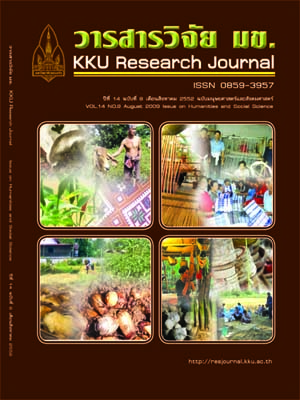Life security development process of youths in rural areas of the Northeast (Thai)
Main Article Content
Abstract
This research was aimed at investigating risk behavior of youths in sexual relationships, drug addiction and violence, factors related to those risk behaviors and at studying the developmental process to enhance rural youthûs security against those behaviors. The participatory action research method was used. Implementation was performed in two phases, beginning from studying the three aspects of risk behavior in the socio-economic context. In the second phase, activity development and participatory processes were conducted with some youth leaders with an aim to enhance their life skills, which will in turn lead to adjustment of the risk behavior. Finally, evaluation was made on the results of the in-depth interview with the youths and their parents and the results of the workshop. Content analysis was used for qualitative data analysis while correlation analysis was applied for quantitative data analysis.
The findings showed that the majority of youths residing near and far from the city (83-84%) used to go to public parks or weekend markets near their communities, the places where teenagers make appointments with the opposite sex and present themselves. About 45% used to have disputes with their friends. The average age when the youths living far from the city first had a dispute was 12.6 years. More than 40% were found to have had sexual intercourse when they were 17 years old. In terms of drug addiction, it was found that the average age at which the youths first consumed drugs was 14 years. It was found that 3 factors had a relationship to the risk behaviors of youths in sexual relationships, use of drugs and violence. These were the age of the youths, their attitude toward the youth way of life, and the youthûs roles in family and community. The means suggested by these youths to enhance their security include participatory training to promote their potentials, and community activities that enable them to express their potentials. Activities conducted have made the youths become more aware of their goals in life. They can understand the difference between male and female, and understand adults better when warned of their behaviors. Community activities to express their potentials enable the youths to exchange their working experiences with their friends and to take responsibility over community activities of which they are proud. Meanwhile, adults have come to accept the youths more than before. All of these make the youths see that they have life skills and security in their future life.


